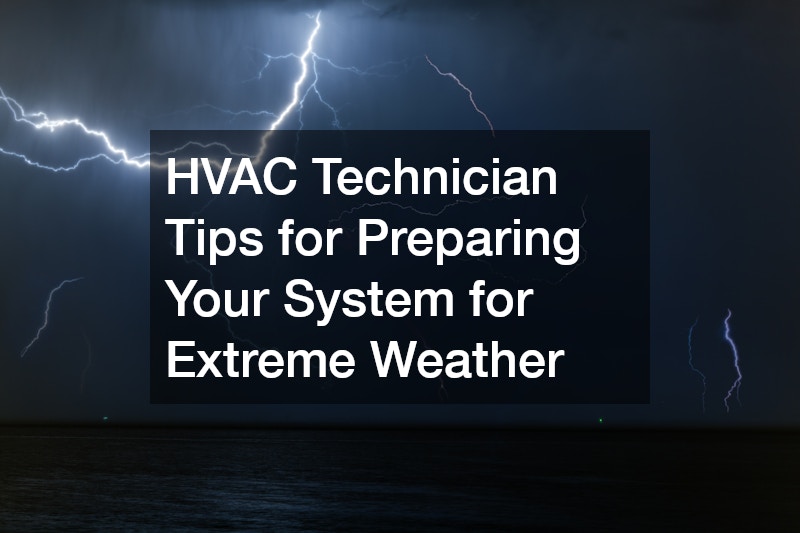The importance of keeping your HVAC system in peak condition cannot be overstated, especially in the face of extreme weather conditions. An efficient HVAC system not only ensures comfort but also contributes significantly to energy savings. By implementing regular maintenance and following expert HVAC technician tips, homeowners can preserve their systems’ longevity and reliability. This article provides a detailed guide on how to maintain your HVAC system, highlighting the impacts of extreme weather, essential maintenance checks, and when to call a professional. We will explore various aspects such as HVAC repairs, cleaning air filters, checking refrigerant levels, and much more, while ensuring your system runs smoothly throughout the year.
Understanding Extreme Weather Impact

Extreme weather conditions, such as heatwaves or freezing temperatures, can drastically affect your HVAC system’s performance. During these times, HVAC repairs can become necessary, as wear and tear are accelerated. It’s essential to understand how these conditions impact your system to anticipate potential problems before they arise.
HVAC technician tips suggest conducting regular inspections and being proactive in mitigating damage caused by severe weather. For instance, ensuring proper insulation around the unit can prevent heat loss in winter or excess heat gain in summer. Simple measures like these can help avoid costly HVAC repairs and reduce energy consumption.
Moreover, extreme weather often leads HVAC systems to operate at full capacity, which can strain components. Homeowners should be mindful of unusual noises or decreased efficiency, which are telltale signs that HVAC repairs may be needed. Staying informed and following professional advice can make a significant difference in system performance.
Regular Maintenance Checks
Regular maintenance checks are crucial for identifying issues before they escalate into significant problems. HVAC companies recommend a bi-annual check-up to ensure that all components are functioning correctly. These checks can include examining electrical connections, calibrating thermostats, and lubricating moving parts, all essential tasks to prolong system life.
One valuable HVAC technician tip is to create a maintenance schedule that aligns with seasonal changes. This proactive approach can help in managing potential issues related to changing weather conditions. It also serves as a reminder to replace or clean filters and perform other critical tasks that might otherwise be overlooked.
Another aspect of regular maintenance involves keeping records of all services performed on your HVAC system. This helps HVAC companies quickly diagnose problems by understanding the system’s history. Regular maintenance, combined with expert advice, can save homeowners from unexpected breakdowns and costly repairs.
Cleaning or Replacing Air Filters
An integral part of HVAC maintenance involves regularly cleaning or replacing air filters. A clogged filter can significantly impair airflow, leading to inefficiencies and additional strain on the HVAC system. HVAC companies recommend checking filters monthly and replacing them every one to three months, depending on usage and the presence of contaminants like pet dander or dust.
Following HVAC technician tips, you can ensure your system operates efficiently by maintaining clean filters. It’s a simple yet impactful task that supports good indoor air quality and prevents unnecessary HVAC repairs. Clean filters also extend the life of your system, reducing the frequency of service calls.
An HVAC company also often emphasizes the benefits of high-quality filters. Advanced models can capture more pollutants, providing an added layer of protection for your system and family health. By keeping filters clean or replaced, you safeguard the system against possible damage due to blocked airways.
Insulating Ductwork

Properly insulating ductwork is an essential aspect of enhancing the efficiency of HVAC systems. Insulation prevents the loss of heated or cooled air as it travels from the HVAC unit to different areas of the home. HVAC services frequently assess ductwork to ensure it is properly insulated to maximize system efficiency and minimize operational costs.
Professional HVAC technician tips recommend using high-quality insulation materials to coat your ductwork. This prevents temperature fluctuations that can strain your system and cause it to operate inefficiently. Additionally, insulating ducts can significantly reduce energy bills by ensuring conditioned air isn’t lost due to inefficient transit.
Ductwork insulation must be regularly inspected to ensure it remains intact and effective. Any visible gaps, tears, or areas with inadequate insulation should be addressed promptly to maintain system efficiency. By prioritizing this aspect of HVAC maintenance, homeowners ensure optimal performance of their heating and cooling systems.
Checking Refrigerant Levels
Refrigerant is a crucial component of your HVAC system, responsible for the cooling and heating processes. It’s essential to ensure that your system is charged with the correct amount of refrigerant for it to operate efficiently. HVAC technician tips often emphasize the importance of having a licensed plumber or technician check refrigerant levels during routine maintenance.
If refrigerant levels are too low, it can affect system performance, leading to inadequate cooling and potential damage to the compressor. Moreover, low refrigerant levels can cause the system to use more energy, increasing operational costs. Knowing the signs of refrigerant issues can help in early detection and resolution.
A licensed plumber or HVAC professional uses specialized equipment to measure refrigerant levels accurately. Regular inspections and timely adjustments ensure your system runs efficiently, reducing the likelihood of costly HVAC repairs. Additionally, understanding the different types of refrigerants and their environmental impacts can help homeowners make informed choices regarding their HVAC systems. Proper management of refrigerant levels contributes significantly to the overall health and longevity of your system, ultimately leading to a more comfortable indoor environment and enhanced energy efficiency. Taking proactive steps to monitor and maintain refrigerant levels is a simple yet vital aspect of HVAC care.
Sealing Leaks
Leaks in your HVAC system, whether in ductwork or around windows and doors, can cause significant energy loss. Sealing these leaks is vital for maintaining system efficiency and reducing energy bills. Local HVAC companies offer services that include identifying and sealing leaks to ensure that your conditioned air remains inside your home.
One of the key HVAC technician tips is to regularly inspect your home for potential leaks and address them promptly. While some leaks may require professional attention, homeowners can often seal minor leaks with materials like weatherstripping or caulk. This proactive approach helps maintain a stable indoor environment and supports system efficiency.
Local HVAC companies can conduct thorough inspections using advanced tools to detect and seal leaks effectively. By employing professional services, homeowners can ensure all leaks are adequately addressed, resulting in a more efficient and cost-effective HVAC system.
Preparing for Heavy Snow or Ice

Winter weather presents unique challenges for HVAC systems, making preparation essential to avoid unexpected breakdowns during harsh conditions. An HVAC inspection before winter sets in can identify potential issues, allowing for timely interventions. Ensuring your system is ready for heavy snow or ice protects it from damage and maintains home comfort.
One useful HVAC technician tip is to clear snow and ice from around outdoor units regularly. This prevents potential damage to the unit and ensures it has adequate airflow to operate efficiently. Heating contractors often advise keeping vegetation and structures at a safe distance from the unit to avoid obstruction.
Additionally, inspecting and maintaining defrost components ensures they function correctly to prevent ice buildup on heat pumps. Regularly checking ductwork for leaks and ensuring proper insulation can also improve energy efficiency during the winter months. Furthermore, sealing any gaps around windows and doors minimizes drafts, allowing your HVAC system to operate more effectively. Preparing your HVAC system for winter not only supports its performance but also extends its life, preventing unnecessary stress and repairs. Taking these proactive measures can lead to significant energy savings and a more comfortable home environment throughout the season.
Addressing Heat Pump Concerns
Heat pumps require particular attention, especially in cold temperatures, as they’re integral to maintaining home warmth. Addressing heat pump concerns is essential to ensure uninterrupted operation during winter. An HVAC repair company can provide detailed inspections and performance evaluations to keep heat pumps functioning optimally.
Frequent cycling or reduced heating efficiency are signs that your heat pump might need attention. HVAC technician tips recommend checking the thermostat settings, ensuring the unit is clear of debris, and maintaining an appropriate level of insulation around the system. These steps can help bolster the system’s performance and reliability.
Professional HVAC companies can offer specific recommendations tailored to unique system requirements. Regular inspections, alongside professional guidance, help in identifying and addressing potential issues before they result in system failure. Keeping heat pumps well-maintained contributes to their longevity and efficiency.
Setting the Thermostat
Efficient thermostat settings are vital for optimal HVAC system performance. Proper thermostat management can significantly reduce energy consumption and maintain comfort levels. AC maintenance services often include assessing thermostat function and settings, ensuring they align with your heating and cooling needs.
One of the most useful HVAC technician tips is to utilize programmable thermostats. These devices adjust temperature settings based on your schedule, maximizing energy savings without sacrificing comfort. They allow for precise control over the indoor environment, ensuring your system operates only when needed.
Furthermore, ensuring your thermostat is correctly calibrated prevents your system from working harder than necessary, thus reducing wear and tear. Regularly updating settings based on changing seasons helps maintain efficiency and system longevity. Incorporating smart thermostats can also enhance this process, as they learn your habits and adjust settings automatically for optimal efficiency. By making informed adjustments and utilizing technology, homeowners can achieve significant savings on energy bills while ensuring a comfortable living space. Proper thermostat management is a simple yet effective way to enhance HVAC performance.
Emergency Preparedness
Emergency preparedness is crucial for homeowners relying on HVAC systems, particularly during extreme weather conditions. Being prepared for emergencies ensures that you can address any sudden system failures promptly. Heating contractors often provide guidelines for emergency preparedness, helping homeowners maintain control over their systems during unexpected events.
Maintaining a backup power source, such as a generator, can keep your HVAC system operational during power outages. Additionally, keeping a list of contact numbers for reliable HVAC services ensures quick access to professional help when needed. Regular maintenance and inspections are preventive measures that also contribute to emergency readiness.
HVAC technician tips recommend creating an emergency plan that includes routine checks and the availability of necessary equipment or parts. These preparations can be the difference between prolonged discomfort and prompt resolution of HVAC issues, ensuring safety and comfort for you and your family. Furthermore, educating your family about the emergency plan, including how to manually operate the system if necessary, can enhance overall preparedness. By taking these proactive steps, homeowners can significantly mitigate the impact of unexpected HVAC failures during critical situations.
When to Call a Professional

While many HVAC maintenance tasks can be handled by homeowners, certain situations warrant professional intervention. Recognizing these circumstances is crucial to prevent further damage and ensure efficient system operation. When in doubt, seeking assistance from a professional HVAC technician can provide peace of mind and protect your investment.
Some of the signs indicating the need for professional service include persistent performance issues, unusual noises, or visible signs of wear and tear. Licensed technicians possess the expertise and tools necessary to diagnose and address problems that may be beyond a homeowner’s capabilities. Being proactive in seeking help can prevent minor issues from escalating into major repairs.
Routine maintenance performed by an HVAC professional can uncover hidden problems that might go unnoticed during DIY checks. Technicians can also provide valuable insights into your system’s overall health and offer recommendations for improvements. Following HVAC technician tips and relying on professional services ensures your system remains in excellent condition, minimizing the risk of unexpected failures and prolonging its lifecycle. Regular check-ups not only enhance efficiency but also contribute to energy savings, ultimately benefiting your wallet and the environment.
Ensuring your HVAC system remains effective and efficient requires a balance of regular maintenance, timely repairs, and professional oversight. By understanding the impacts of extreme weather, conducting necessary checks like cleaning air filters or insulating ductwork, and knowing when to call in professionals, homeowners can maintain their systems effectively. Implementing the HVAC technician tips provided throughout this article will help optimize performance, reduce energy costs, and prolong system lifespan. Stay proactive and informed about your HVAC system’s needs, and it will continue to provide comfort and reliability regardless of external conditions. Remember, regular upkeep is the key to preventing unnecessary expenses and ensuring peace of mind year-round.

